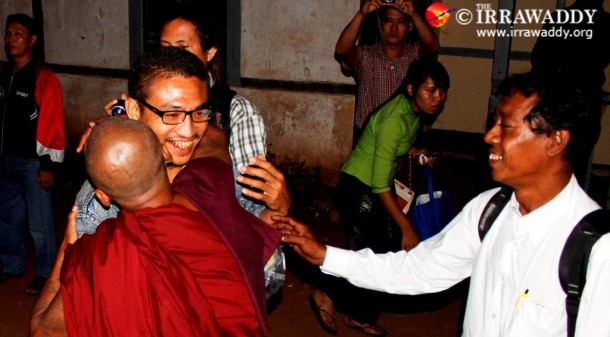Famous former dissident monk Gambira was released on bail from Rangoon’s notorious Insein Prison on Monday after 10 days of detention.
Gambira (aka Nyi Nyi Lwin), who grew to prominence for his leading role instigating the monk-led 2007 Saffron Revolution, was rearrested by police on Dec. 1 during a rally to protest a violent crackdown on anti-copper mine demonstrators in Sagaing Division.
The outspoken 33-year-old told The Irrawaddy by phone on Tuesday morning that he was released from Thanlyin Township Court having paid four million kyat (US $4,600) bail—his lawyer Soe Han and former student activist Zaw Win each paid two million kyat on his behalf.
Gambira was arrested at his friend Nyi Nyi Zaw’s house in Hlaing Township after taking part in a monk-led protest in Rangoon against the brutal pre-dawn raid on peaceful protesters at Letpadaung copper mine on Nov. 29.
He came to Rangoon from his home in Meiktila, Mandalay Division, to pick up medication and to meet with different advocacy groups, including Amnesty International. He recalled being brought to Thingangyun Township Police Station where his information was taken after his arrest and was then transferred to Thanlyin Police Station.
“They kept me in a cell at Thanlyin Police Station without any warrant for three days,” he said. “Then I was transferred to notorious Insein Prison on the evening of Dec. 3.”
“This is an unlawful act,” said the former clergyman who served four years before receiving a presidential pardon in January this year. Gambira was sentenced to 63 years in prison for his role leading the Saffron Revolution in September 2007.
“I doubt our nation’s path to democracy because of such acts by the police,” he said. “How can we trust that Burma is moving towards democracy and ensuring standards of human rights?”
Gambira has been rearrested three times since January for removing the locks from several monasteries in February as well as staying in a monastery without permission. The buildings had been sealed by the authorities as they believed that the resident monks played an active role in dissident activities.
All those freed in amnesties since 2011 have been granted conditional release under Section 401 of the Code of Criminal Procedure. Any prisoner who is subsequently deemed by the authorities to have breached these terms can be returned to prison to serve the remainder of their original sentence.
Gambira is currently charged with three offences under the Burmese Penal Code—Section 448 for house trespassing, carrying a penalty of up to one year imprisonment; Section 427 for damaging the dignity of the nation, with a penalty of up to two years; and Section 454 for house-breaking, with a penalty of up to 10 years.
He claims to have been told by the judge that no trial date has so far been set—it was previously thought to be on Friday, Dec. 14—but that he must come to the court when summoned by the police.
“I have to go abroad for my medical treatment, to America, but they have set me up like this, causing delays for my travel,” said Gambira, who suffers from a neurological condition. “I was not given my medicine for three days from Dec. 3 to 5 in Insein prison, and that periods hurt me a lot.”
After resting for a couple of days due to his chronic ill-health, Gambira will travel back to his home in Meiktila where he has been staying with his parents after leaving the monkhood. He revealed that prison conditions have improved greatly compared with his previous years of detention although further changes are still needed.
“They worry about me leading the protest after the crackdown on Letpadaung copper mine,” he said. “There are other leaders who are capable of handling this. I was not planning to do anything because of my health.”
Meanwhile, eight other activists arrested last week and sent to Insein Prison for leading protests in November were also released on bail from courts in Rangoon’s Kyauktada and Pabedan townships on Tuesday.
Wai Lu, the coordinator of the Rangoon Civil Assistance Network, said the authorities should use civil society groups for nation-building rather than seeing them as dissidents. “We forgive the authorities’ treatment of us, but we cannot bear similar treatment like that in the future,” he said.
Six protesters, including Wai Lu and Naw Ohn Hla, have been charged under Section 505(b) of the Burmese Penal Code with their trial due on Dec. 24. The two other leading protesters—Moe Thway and Aung Soe—have been charged under the Section 18 of the Peaceful Assembly Law and 505(b).

















